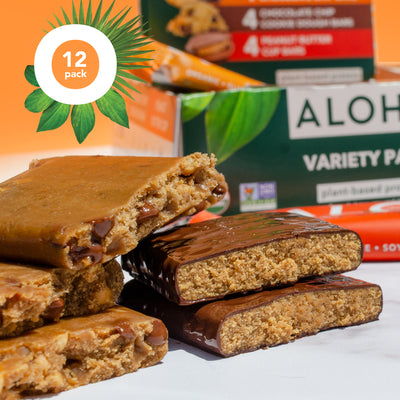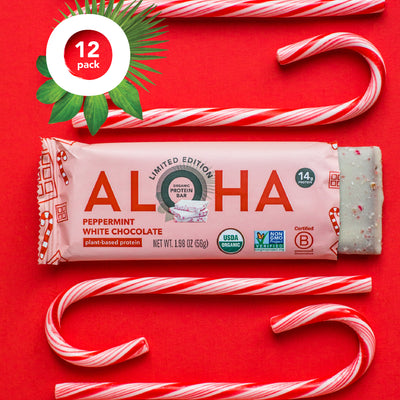Key Takeaways:
- Protein Is Essential for Workouts: Protein supports muscle recovery, reduces soreness, and builds strength after exercise, making it a vital part of any fitness routine.
- Pre- and Post-Workout Protein Have Benefits: Pre-workout protein helps with energy and endurance, while post-workout protein focuses on recovery and muscle repair.
- Plant-Based Protein Options Fit Any Lifestyle: ALOHA offers convenient protein bars, shakes, and powders to make pre- and post-workout nutrition simple and effective.
At ALOHA, we pride ourselves on being a trusted leader in plant-based nutrition, offering high-quality, organic, and non-GMO products that fit seamlessly into your lifestyle. Our mission is to make wellness simple and approachable with protein solutions that are as nutritious as they are delicious. Whether it’s a quick snack or a post-workout shake, we’ve created products that align with your fitness goals and busy schedule.
Protein timing plays a vital role in optimizing your workout routine. Consuming protein at the right time—whether before or after exercise—can impact energy, recovery, and performance. Pre-workout protein can provide sustained energy and reduce muscle breakdown, while post-workout protein aids in muscle repair and reduces soreness. Knowing how to balance these can help you make the most of your workouts and achieve consistent progress.
In this piece, we’ll explore the science and benefits of eating protein before and after your workouts. You’ll gain actionable insights into timing your intake and learn how ALOHA’s plant-based options can simplify your nutrition while supporting your fitness journey.
Why Protein Is Essential For Workouts
Protein is the foundation of your body’s ability to repair and grow after exercise. During a workout, your muscles experience tiny tears as they’re pushed to their limits, and protein steps in to rebuild those fibers stronger than before. Without enough protein in your diet, your muscles can’t recover efficiently, leaving you tired, sore, and less ready for your next workout.
Think of protein as your repair crew, arriving when your body needs it most. It supports muscle recovery and helps maintain your energy levels and overall performance. Whether you’re hitting the weights, pounding the pavement, or flowing through yoga poses, protein ensures your body stays resilient and prepared for whatever comes next.
Benefits Of Eating Protein Before A Workout
Eating protein before your workout is like setting the foundation for a strong, efficient session. It ensures your muscles are primed to perform and recover, reducing fatigue and muscle breakdown. Let’s explore how pre-workout protein can make all the difference:
Stabilizing Energy Levels For Peak Performance
Protein helps balance your energy levels, preventing mid-workout crashes. Unlike quick-burning carbs, it provides sustained energy that keeps you moving strong from start to finish. Paired with healthy carbs, protein becomes a powerful ally in helping you stay focused and energized.
Reducing Muscle Breakdown During Exercise
When you work out, your muscles endure tiny tears that need repair. Eating protein before exercising supplies your body with the amino acids it needs to reduce this breakdown. This means less muscle damage and a quicker recovery time after your session.
Enhancing Strength And Endurance
Pre-workout protein doesn’t just fuel your energy—it boosts your overall performance. It helps your muscles work more efficiently, improving endurance and power. With consistent protein intake before workouts, you may notice gains in both strength and stamina.
Benefits Of Eating Protein After A Workout
Eating protein after your workout is like hitting the reset button for your muscles. Post-workout protein helps repair the tiny tears caused by exercise, rebuild strength, and even reduce soreness. Here’s why timing your protein intake after a workout matters:
Supporting Muscle Recovery And Growth
After a workout, your muscles are primed to absorb nutrients to repair and grow. Protein delivers essential amino acids to help rebuild muscle fibers stronger than before. This process enables you to see progress over time—whether that’s building strength, endurance, or both.
Reducing Post-Workout Soreness
Protein plays a crucial role in minimizing delayed-onset muscle soreness (DOMS). By reducing inflammation and kickstarting muscle repair, post-workout protein can help you recover faster. This means less discomfort and more readiness for your next session.
Replenishing Energy Levels
Exercise depletes your energy reserves; protein and carbohydrates can help restore them. Protein provides the building blocks for muscle recovery while supporting overall energy replenishment. For example, a post-workout smoothie with ALOHA protein powder can help you refuel quickly and effectively.
Comparing Pre-Workout Vs. Post-Workout Protein Consumption
When it comes to protein timing, there’s no one-size-fits-all approach. Some swear by fueling up beforehand, while others prioritize recovery after a workout. The good news? Both have unique benefits, and the right choice depends on your goals and preferences:
The Case For Pre-Workout Protein
Consuming protein before a workout helps set the stage for peak performance. It supports your body by reducing muscle breakdown during exercise and providing a steady energy supply throughout your session. This approach is especially beneficial for longer or more intense workouts, as it primes your muscles for exertion and helps combat early fatigue.
The Case For Post-Workout Protein
Post-workout protein intake is all about aiding recovery. After strenuous exercise, your muscles are in a repair phase, and protein helps rebuild and strengthen them, reducing soreness and speeding up recovery. This method is essential if your goal is to maximize muscle growth, recover quickly, or prepare for your next workout session.
Balancing Both For The Best Results
You don’t have to choose between pre- and post-workout protein—combining both can offer maximum benefits. Consuming protein before exercise energizes you, while post-workout protein ensures faster recovery and muscle repair. Incorporating options like a pre-workout snack and a post-workout shake, such as one made with ALOHA protein powder, can help optimize your performance and results.
How Much Protein Should You Consume?
Finding the right amount of protein doesn’t have to be complicated. Your body’s protein needs depend on your fitness goals, activity level, and overall diet. The key is to focus on balance and consistency, not perfection. Here’s how to get it right:
General Guidelines For Protein Intake
For most active individuals, a good starting point is 0.6 to 0.8 grams of protein per pound of body weight daily. This ensures your body has enough fuel to repair muscles and support energy. If you’re strength training or trying to build muscle, you may need closer to 1 gram per pound.
Timing Your Protein For Maximum Benefit
Spreading your protein intake throughout the day helps your body absorb it more effectively. Aim to include protein in each meal or snack—whether a pre-workout bite or a post-workout shake. For instance, blending ALOHA protein powder into your breakfast smoothie or a midday snack can make this effortless.
Listening To Your Body
Your wellness journey is unique, and your protein needs might change over time. Pay attention to how you feel—are you recovering well, staying energized, and seeing progress? Adjust as needed; remember, it’s about finding what works for you.
Simple Plant-Based Protein Choices For Active Lifestyles
When fueling your fitness journey, having convenient, plant-based options makes all the difference. ALOHA offers a range of protein-packed products designed to support your workouts, recovery, and everyday health—all while keeping things simple and delicious. Here are some great ways to incorporate Aloha into your active lifestyle:
ALOHA Protein Bars
Perfect for a quick energy boost before or after your workout, ALOHA protein bars are packed with 14 grams of plant-based protein. They come in various crave-worthy flavors, like Chocolate Chip Cookie Dough and Peanut Butter Chocolate Chip. Easy to carry and incredibly satisfying, they’re the ultimate grab-and-go snack for your busy day.
ALOHA Protein Drinks
For a smooth and refreshing option, ALOHA’s ready-to-drink protein shakes deliver 18 grams of plant-based protein. These drinks are ideal for refueling after a workout or as a midday pick-me-up. Flavors like vanilla and chocolate sea salt are as tasty as they are nutritious, and no mixing or measuring is required.
ALOHA Protein Powders
If you love customizing your nutrition, ALOHA protein powders are versatile. With 18 grams of organic plant-based protein per serving, they blend easily into smoothies, oats, or baked goods. They’re available in classic flavors like Chocolate and Vanilla, making creating delicious, protein-rich recipes at home simple.
Tips For Maximizing Your Protein Intake Timing
Making the most of your protein intake doesn’t have to feel like a science experiment. You can ensure your body gets the protein it needs with simple strategies. Here’s how to make timing work for you:
Pair Protein With Balanced Meals
Combining protein with carbs and healthy fats can help keep your energy steady and your muscles nourished. For example, pairing an ALOHA protein shake with a banana before a workout gives you quick and sustained energy. Post-workout, adding a handful of nuts or seeds to your protein smoothie can aid recovery and satiety.
Plan For Busy Days
Life gets hectic, but your protein intake doesn’t have to suffer. Keep ALOHA protein bars or ready-to-drink shakes on hand for those on-the-go moments. A little planning ensures you never miss an opportunity to fuel your body, even when your schedule is packed.
Time Protein Around Your Workouts
Eating protein within 30 minutes to two hours of your workout can optimize muscle recovery. Try an ALOHA protein bar for pre-workout fuel; for post-workout recovery, a protein shake is quick and effective. Timing your intake can help you get the best results from your exercise routine.
Mix It Up With Creative Recipes
Getting your daily protein doesn’t have to be boring! Use ALOHA protein powders to create smoothies, pancakes, or energy bites that fit your taste and schedule. Making snacks allows you to control what goes into your body while keeping it fun and delicious.
Final Thoughts
Whether to consume protein before or after a workout highlights an important truth: protein is indispensable in any fitness routine. While timing can influence performance and recovery, what truly matters is consistency in fueling your body with the nutrients it needs to perform at its best and recover effectively. Whether you’re an early-morning runner, a weightlifting enthusiast, or someone looking to stay active, aligning your protein intake with your unique schedule and goals ensures sustainable progress.
Protein isn’t just about building muscle—it’s about creating a foundation for overall health, endurance, and resilience. Plant-based, high-quality protein options like those from ALOHA align nutrition with simplicity and lifestyle balance. As you continue your fitness journey, focus on integrating protein as part of a holistic approach to your well-being, where nourishment, movement, and recovery come together seamlessly.
Read also:
- When Should You Eat A Protein Bar? Best Times For Optimal Benefits
- How To Get Protein On A Vegan Diet: Top Plant-Based Sources
- How Many Protein Shakes A Day? Expert Advice For Vegans
Frequently Asked Questions About Should You Eat Protein Before Or After A Workout
Is protein timing important for everyone?
Protein timing can benefit individuals with active lifestyles or specific fitness goals. Casual exercisers may not need to focus heavily on timing but should still meet daily protein needs.
Can I combine protein with carbs for better results?
Yes, combining protein with carbs can improve energy levels and muscle recovery. This pairing works well both before and after workouts.
What happens if I skip protein after a workout?
Skipping protein post-workout may delay muscle recovery and increase soreness. However, getting enough protein throughout the day can still support long-term progress.
Can I have too much protein at once?
Overeating protein in one sitting may result in unused excess stored as energy. Spreading intake throughout the day ensures your body absorbs it more efficiently.
Is it okay to rely on plant-based protein for workouts?
Absolutely, plant-based protein is a great option for fueling workouts and recovery. It’s effective, sustainable, and supports overall health.
How soon should I eat protein after a workout?
Consuming protein within 30 minutes to two hours after a workout is ideal. This window maximizes muscle repair and growth.
What’s the best portable protein option for workouts?
ALOHA protein bars or ready-to-drink shakes are convenient, tasty, and packed with plant-based protein. They’re perfect for fueling up on the go.
Do I need protein supplements if I eat a balanced diet?
Supplements are helpful for meeting protein needs when life gets busy. They’re not required but can make hitting daily targets easier.
Does protein timing matter more for weightlifting than cardio?
Protein timing is slightly more critical for activities like weightlifting that cause muscle breakdown. However, it can still support endurance and recovery in cardio workouts.
Can I have protein shakes even if I’m not working out?
Yes, protein shakes are a convenient way to meet daily protein needs, even on rest days. They’re also a great snack option for a busy schedule.
Sources:
1. Ganson, K. T., Nguyen, L., Raza, A., Nagata, J. M., Rodgers, R. F., Murray, S. B., & Alaggia, R. (2023). “Eat more protein, build more muscle”: A grounded theory study of muscle-building behaviors among Canadian adolescents and young adults. Body Image, 47, 101635–101635. https://doi.org/10.1016/j.bodyim.2023.101635
2. Westcott, W. L., & La Rosa Loud, R. (2013). BUILD MUSCLE. ACSM’s Health & Fitness Journal, 17(2), 10–15. https://doi.org/10.1249/fit.0b013e318282989e
3. Flores-Balderas, X., Peña-Peña, M., Rada, K. M., Alvarez-Alvarez, Y. Q., Guzmán-Martín, C. A., Sánchez-Gloria, J. L., Huang, F., Ruiz-Ojeda, D., Morán-Ramos, S., Springall, R., & Sánchez-Muñoz, F. (2023). Beneficial Effects of Plant-Based Diets on Skin Health and Inflammatory Skin Diseases. Nutrients, 15(13), 2842. https://doi.org/10.3390/nu15132842
4. Fam, V. W., Charoenwoodhipong, P., Sivamani, R. K., Holt, R. R., Keen, C. L., & Hackman, R. M. (2021). Plant-Based Foods for Skin Health: A Narrative Review. Journal of the Academy of Nutrition and Dietetics, 122(3). https://doi.org/10.1016/j.jand.2021.10.024
5. Ayaz, A., Zaman, W., Radák, Z., & Gu, Y. (2024). Green strength: The role of micronutrients in plant-based diets for athletic performance enhancement. Heliyon, 10(12), e32803. https://doi.org/10.1016/j.heliyon.2024.e32803
6. Hertzler, S. R., Lieblein-Boff, J. C., Weiler, M., & Allgeier, C. (2020). Plant Proteins: Assessing Their Nutritional Quality and Effects on Health and Physical Function. Nutrients, 12(12), 3704. https://doi.org/10.3390/nu12123704
ALOHA's products are not intended to treat, diagnose, mitigate, prevent, or cure disease. ALOHA's products should not replace prescribed medications or the variety of foods important to a healthful diet.
Do not self-diagnose any health condition. Work with your healthcare provider to determine how best to achieve optimal health.











